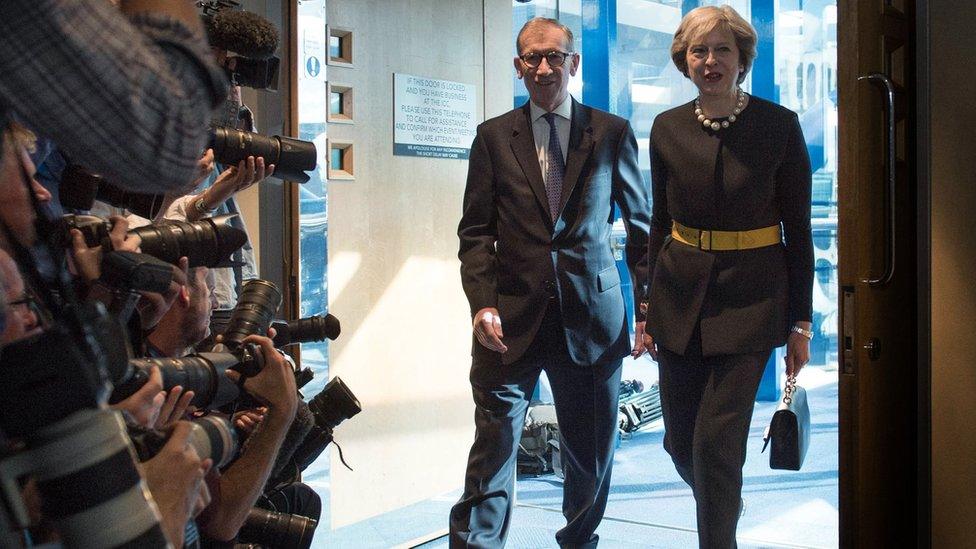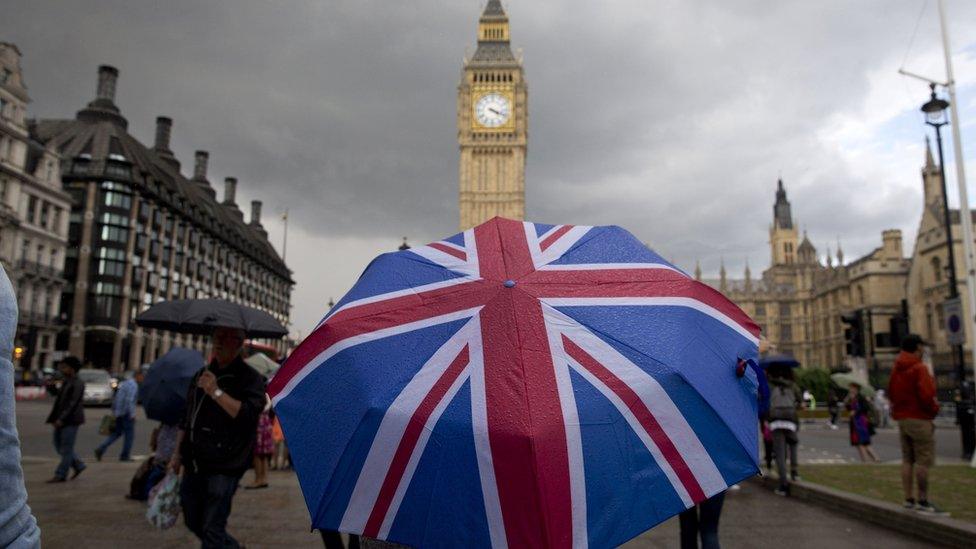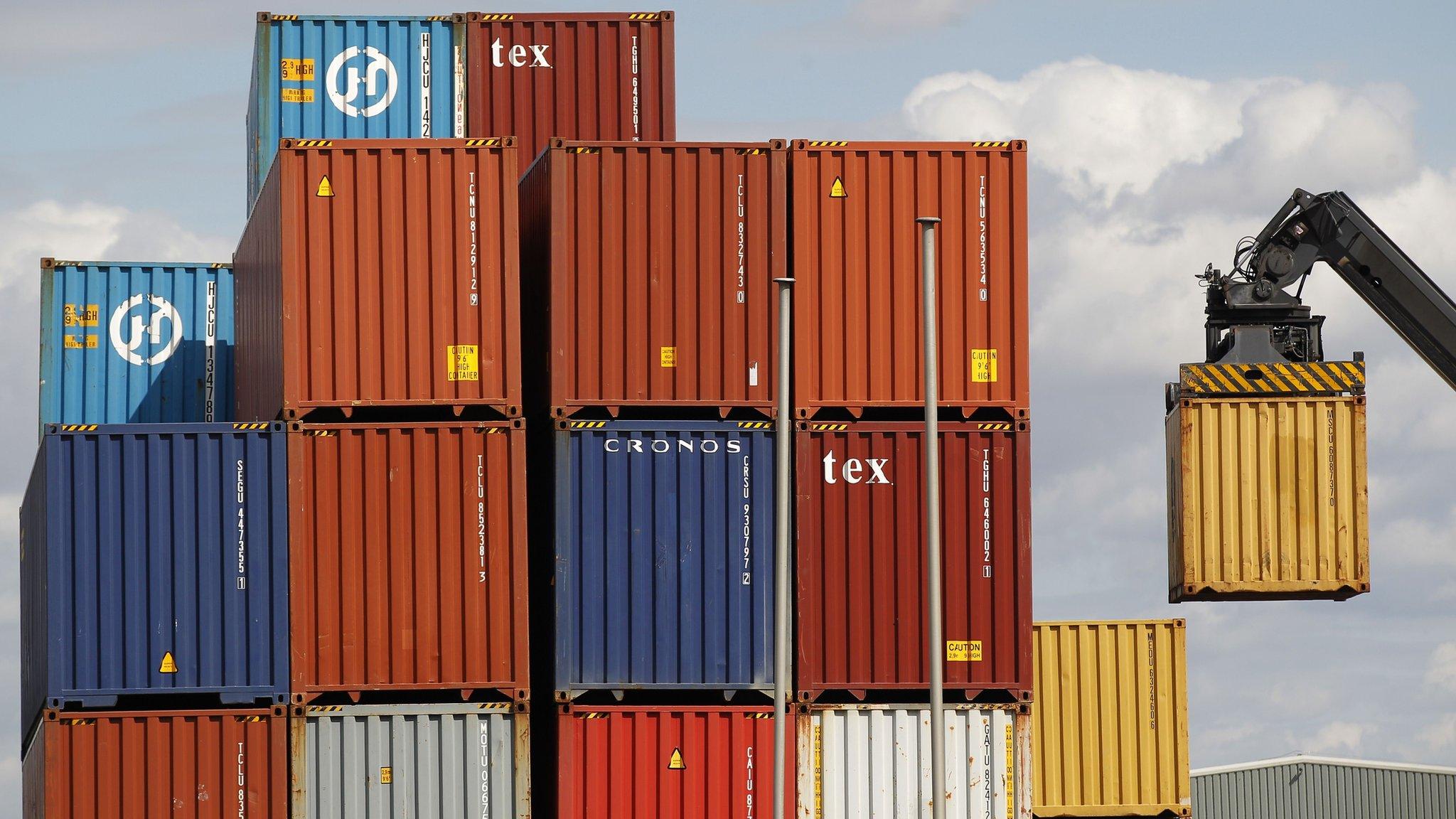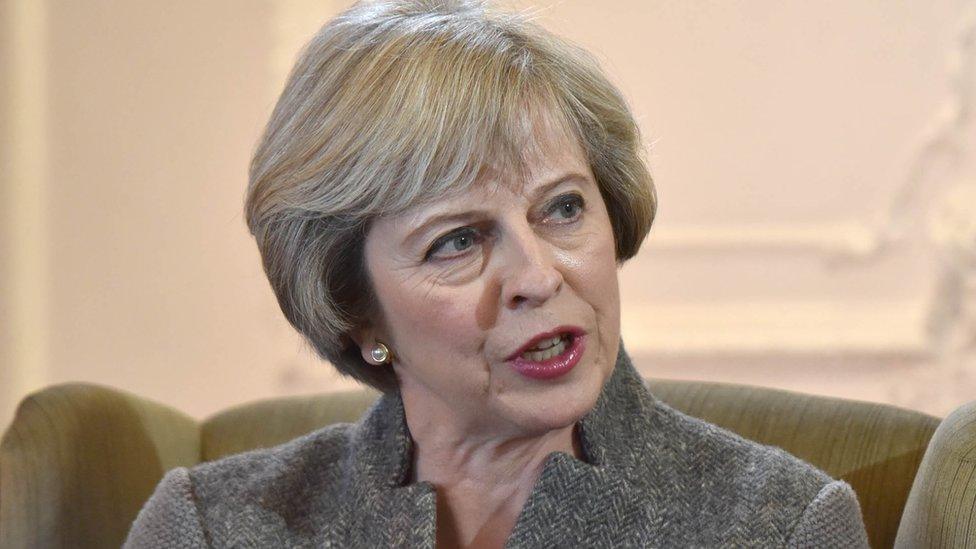Brexit: Theresa May to trigger Article 50 by end of March
- Published
- comments
Theresa May calls for "a truly global Britain" after confirming the deadline for triggering Article 50 to leave the EU
The UK will begin the formal Brexit negotiation process by the end of March 2017, PM Theresa May has said.
The timing on triggering Article 50 of the Lisbon Treaty means the UK looks set to leave the EU by summer 2019.
Mrs May told the Tory Party conference - her first as prime minister - the government would strike a deal with the EU as an "independent, sovereign" UK.
Voters had given their verdict "with emphatic clarity", she said, and ministers had to "get on with the job".
In a speech on the first day of the conference in Birmingham, she also gave details of a Great Repeal Bill which she said would end EU law's primacy in the UK.
She attacked those who "have still not accepted the result of the referendum", adding: "It is up to the government not to question, quibble or backslide on what we have been instructed to do, but to get on with the job."
She told delegates: "We are going to be a fully independent, sovereign country - a country that is no longer part of a political union with supranational institutions that can override national parliaments and courts.
"And that means we are going, once more, to have the freedom to make our own decisions on a whole host of different matters, from how we label our food to the way in which we choose to control immigration."
Mrs May said a "truly global Britain is possible, and it is in sight", adding: "We don't need - as I sometimes hear people say - to 'punch above our weight' because our weight is substantial enough already."
Reacting to Mrs May's comments about Article 50:
The CBI said there was still an "urgent need for answers" on single market access and business regulations
The cross-party Open Britain campaign warned Mrs May about being "gung ho" and said she should not "expect any favours from Parliament" on her repeal bill
Labour's shadow foreign secretary Emily Thornberry said the Article 50 commitment was "meaningless" without the government saying what it wanted to achieve
European Council President Donald Tusk said the announcement brought "welcome clarity"
Scotland's Brexit minister warned the Scottish Parliament might block the "Great Repeal Bill"
Scottish First Minister Nicola Sturgeon said it was "depressing" that government decisions were "being driven by ideology of the hard Brexiteers, rather than interests of country"
Leading Brexit campaigner Iain Duncan Smith said the PM had set a "fairly reasonable" timetable and thought Article 50 could be triggered sooner than March
Lib Dem leader Tim Farron called for clarity before Article 50 was triggered, adding: "We can't start the process without any idea of where we're going"
Theresa May confirms Article 50 deadline
The PM, who had previously only said she would not trigger Article 50 this year, ended speculation about the government's timetable on BBC One's The Andrew Marr Show on Sunday morning.
She said it would be done by "the first quarter of 2017", marking the start of a two-year exit process.
The process of leaving the EU would be "quite complex", she said, but added that she hoped there would now be "preparatory work" with the remaining EU members so that "once the trigger comes we will have a smoother process of negotiation".
She added: "It's not just important for the UK, but important for Europe as a whole that we're able to do this in the best possible way so we have the least disruption for businesses, and when we leave the EU we have a smooth transition from the EU."
The PM also said June's vote to leave the EU had been a "clear message from the British people that they want us to control movement of people coming into the UK".

Analysis

By Laura Kuenssberg, BBC political editor
Theresa May has appeared dozens of times on Tory conference platforms before, but before she had uttered a word, this afternoon marked an occasion that will matter to the party's history.
She may not have been elected as prime minister, but with four years until the next general election, far from sticking to David Cameron's plan, she plans not to waste a minute implementing her agenda.
It will be far from easy - former ministers are already muttering about her direction. She has a tiny majority, and no individual mandate for her reforms.
But on the biggest challenge before her - taking the UK out of the European Union - Theresa May still is characteristically reticent.

Mrs May also promised a "Great Repeal Bill" in the next Queen's Speech, to remove the European Communities Act 1972 from the statute book and enshrine all existing EU law into British law.
The repeal bill will enable Parliament to amend and cancel any unwanted legislation and also end the jurisdiction of the European Court of Justice in the UK.
Mrs May said this was an "important step", adding: "That means the UK will be an independent sovereign nation, it will be making its own laws."
The repeal of the 1972 act will not take effect until the UK leaves the EU under Article 50.

European Communities Act 1972
Theresa May told the BBC's Andrew Marr that repealing the EU act will make the UK "sovereign and independent"
In 1972 the UK Parliament passed the European Communities Act
It gave direct effect to EU law, so if there is a conflict between an act of the UK Parliament and EU law, Westminster loses out and EU law prevails
The European Court of Justice (ECJ) became a kind of Supreme Court of Europe, interpreting EU law with judgements that were binding on all member states

- Published2 October 2016
- Published12 June 2017

- Published29 September 2016

- Published4 September 2016
